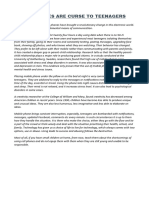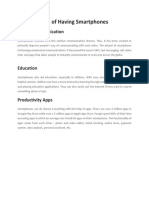0% found this document useful (0 votes)
178 views2 pagesEssay - Smartphones A Blessing or Course
Smartphones have provided many benefits like easier global communication and access to information, entertainment and education apps. However, recent studies show smartphone addiction is rising among students and linked to lower academic performance and psychological issues like anxiety and depression. While smartphones make lives more convenient, overuse can negatively impact health and relationships by reducing face-to-face interaction. Achieving balance by limiting daily smartphone use to two hours and assigning time for specific activities may help address these issues, but reducing dependence on these devices remains a challenge.
Uploaded by
TadeoAdcCopyright
© © All Rights Reserved
We take content rights seriously. If you suspect this is your content, claim it here.
Available Formats
Download as RTF, PDF, TXT or read online on Scribd
0% found this document useful (0 votes)
178 views2 pagesEssay - Smartphones A Blessing or Course
Smartphones have provided many benefits like easier global communication and access to information, entertainment and education apps. However, recent studies show smartphone addiction is rising among students and linked to lower academic performance and psychological issues like anxiety and depression. While smartphones make lives more convenient, overuse can negatively impact health and relationships by reducing face-to-face interaction. Achieving balance by limiting daily smartphone use to two hours and assigning time for specific activities may help address these issues, but reducing dependence on these devices remains a challenge.
Uploaded by
TadeoAdcCopyright
© © All Rights Reserved
We take content rights seriously. If you suspect this is your content, claim it here.
Available Formats
Download as RTF, PDF, TXT or read online on Scribd
/ 2
























































